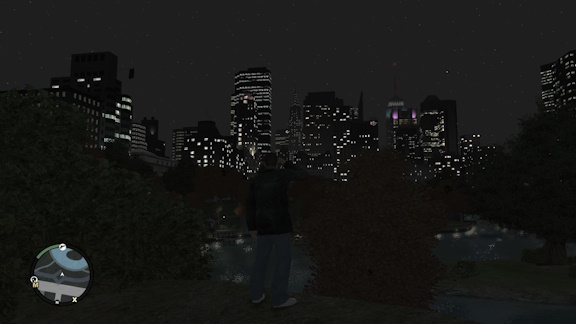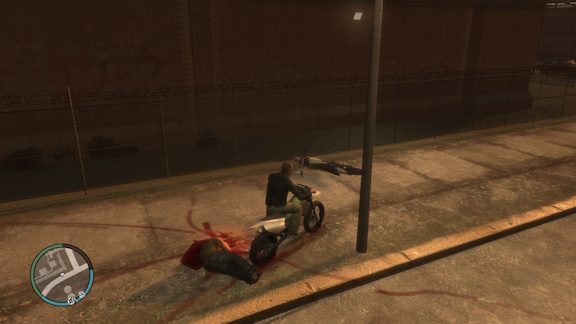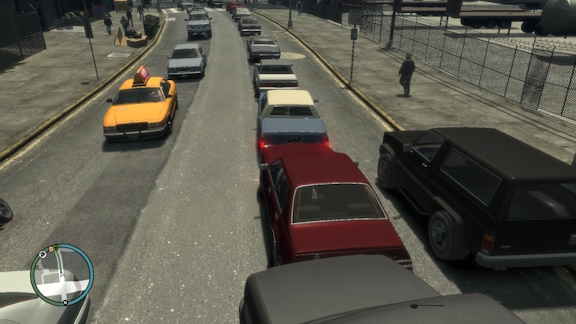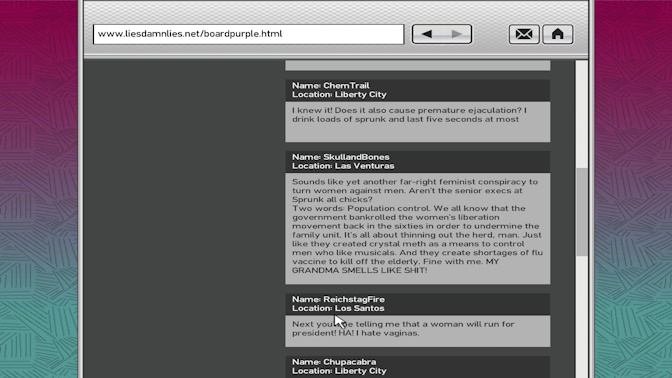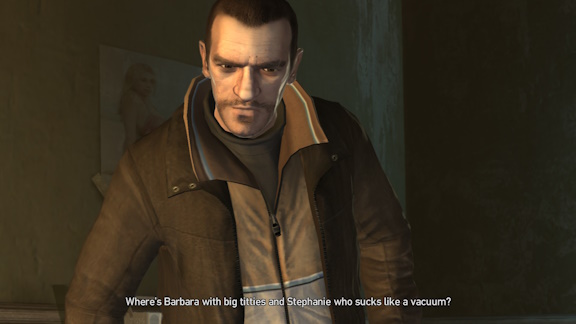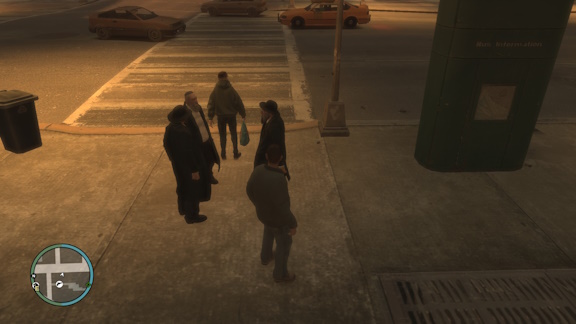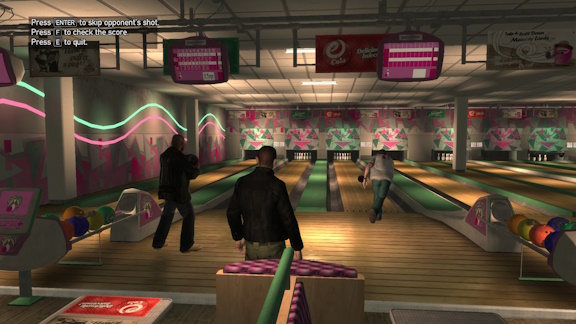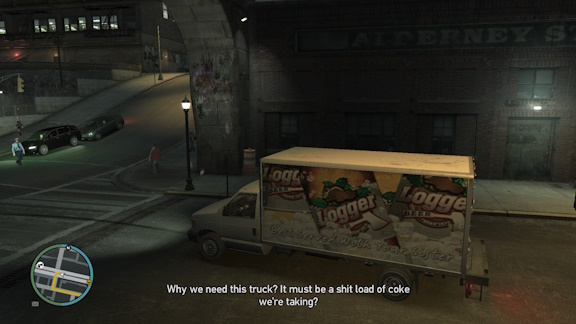Grand Theft Auto IV
Downgraded to the New York Groove
I come before you today a remorseful man, asking for forgiveness. I am too susceptible to public opinion. Echo chambers program strangers' thoughts into my head, and Internet yahoos formed the way I view the world.
This is a longer way of saying I spent the last 16 years thinking Grand Theft Auto IV was a mediocre video game. Part of that was based on my own experience. I also let word-of-mouth push me into believing it was the black sheep of the series.
I wasn't the only one, though. A lot of people ragequit Grand Theft Auto IV too early. That's because the previous title in the series was Grand Theft Auto: San Andreas, where Rockstar crammed an entire state onto a PlayStation 2 disc. It was the one where, after stuffing your face enough to vomit all over Burger Shot, you could strip down to underwear and a joke mask and ride a combine harvester through the desert. Turn all the gang territory green. Gamble in your Pimp Suit. San Andreas was the first Grand Theft Auto to delve into a deeper character narrative, but it was rooted in making the world yours. It also presented something resembling virtual reality.
Grand Theft Auto IV takes that virtual reality aspect and floors the gas pedal—till you crash the car because you turned too sharp. The game still offers freedom of movement; you can, for instance, still go on shooting rampages and leave police custody the next morning. But it begins the tradition of Rockstar locking you into the story it wants to tell, a tradition it continued in Grand Theft Auto V.
At least I could walk past a building without failing a mission, though. Your move, GTA V.
I owned a (physical) Grand Theft Auto IV copy a time or two in the past, and I did install and play them. But I always walked away somewhere around the melee combat tutorial. Now those old consoles were gone, along with the copies, and any ability to play GTA IV. I'd spent the past 16 years spitting on it. To finally give GTA IV a real shot, I bought it during a Steam Sale.
But before I could even boot it, I had to jump through hoops. See, Rockstar Games can never be asked to do shit about its PC ports, especially older titles it patched into unplayability. GTA IV, in particular, always had a troubled history on PC. By the time I returned to the game, Rockstar had converted it into something called ‘The Complete Edition.’ In addition to deleting about half the songs from the radio stations, they left the game a broken, buggy, sorry mess and said, “Well, that sounds alright to us.”
Even worse, something called a ‘Store Launcher’ blocked every attempt to start the game, either from my Steam Deck or my computer. To get the game that I, a legal customer, paid for, I needed to register an account for DRM that would sit on top of DRM that was already there.
This put me in a state of buyer's remorse. I wasn't going to register a separate account, and I prefer playing games more than five minutes between crashes. I was able to locate something called the ‘Downgrader Patch.’ Not only did it fix the bugs, not only did it restore the soundtrack, it allowed me to skip over the login screen. Ha ha, fuck you, modern gaming bullshit!
Getting to play the game re-introduced me to Niko Bellic, Grand Theft Auto IV's central antihero. Niko is a Serbian immigrant who, after a lifetime of war, smuggles his way into Liberty City, GTA's stand-in for New York.
We last visited Liberty City in Grand Theft Auto III, and it was a major step forward in 3D gaming. Seven years later, this Liberty City makes the old one feel like a Duke Nukem 3D user map in comparison. It's much bigger and brighter, with its five islands more accurately capturing various New York City aesthetics. Economic diversity is abundant. For instance, the Bohan borough is an eyesore, while Algonquin's neon lights and looming towers are as wondrous as they are intimidating.
With less hardware limits to contend with than the PlayStation 2, Rockstar expands their ability to satirize America. The in-game radio used to be the only method of lampooning our hilariously bad tendencies, but now there's the ability to watch television and browse an in-game Internet. Altogether, a living, breathing comedy universe surrounds Niko. Every billboard, webpage, and radio commercial oozes greed, consumerism and narcissism. Liberty City is full of people taking every privilege allotted to them for granted, and always walking away with the wrong lessons learned.
Granted, Rockstar's satire can be too on the nose with its cynical irony, particularly on the impressive, but dare I say, angry Internet. Liberty City's citizens post with a rather unrealistic lack of self-awareness, as if the real life writer behind them chomped at the bit. The formula always goes, “I'm an American; I like dumb American things, and I am stupid.”
However, cynical or not, what blew me away was how much of GTA IV is a time capsule of 2008. It threw me back in time 16 years, to a world of Internet cafes, flip phones, Web 2.0 browsers, terrible reality shows, and early social media. 2008 was a strange, sad era of growing pains. We were starting to smile again after 9/11, but we also faced an economic crisis. New technology emerged. The Internet evolved. Instead of using these opportunities to improve quality of life, we instead embraced more stupidity.
Typical of a GTA game, only one area is accessible at the game's start. In the past, the reasons ranged from bridge damage, hurricanes, or the powers-that-be controlling your character's movements. In GTA IV, it's “the terrorists.” On the radio, Weazel News breaks in to blame any damage Niko causes on “the terrorists.” The Internet provides in-depth coverage of the Jingoism Act, an obvious stand-in for the infamous Patriot Act.
Niko's main objective is to hunt a man who betrayed his childhood friends. Meanwhile, his cousin Roman has been writing e-mails about how much wealth, success, and vagina America has bestowed upon him. As an ulterior motive, Niko sees Liberty City as a chance for a better life.
When Niko arrives, however, he does not find, and I quote, “Veronica with big titties and Stephanie who sucks like a vacuum.” Instead, Roman barely manages a cab company and lives in a crappy apartment. He also owes lots of money to bad people.
Typical of the GTA narrative, Niko has to work for bad people himself to help his cousin pay his debts, a journey that plunges him into Liberty City's underworld. He works his way up from bottom level soldiers to Mafia dons to the U.S. government. This all follows a formula. Where it differs, however, is in the ultimate objective, and Niko's circumstances along the way. Previous GTA entries were about amassing enough capital to eventually eliminate your opposing enemies. I assumed that by the end of Grand Theft Auto IV, I would have 12 safehouses scattered across the map, a huge mansion as my headquarters, and businesses generating more revenue than I could spend.
Slight spoiler: that doesn't happen. Instead, the narrative places a stronger emphasis on Niko trying to find peace. When completing the main story missions on the second island, I noticed the majority went something like this:
MISSION PROVIDER: I got a problem. There's a man causing me trouble, you understand? Trouble needs dealing with sometimes. Sometimees, trouble needs to be shot in the face. You get me?
NIKO: As long as I get paid.
That's pretty much it. Niko is told to go kill someone. He drives there, kills the guy, gets paid. Sometimes mission providers ask him to oversee drug deals, or steal drugs, and it goes hilariously wrong. Can you imagine a mission where you're hired “just in case there's trouble,” and nothing happens?
At first I thought this mission structure was repetitive, even lazy. Then it dawned on me that it was like this on purpose. Niko's life is rooted is in violence with no apparent way out, which is why the second island is almost nothing but contract kills. At the center of it, he wants to help his obnoxious cousin and achieve normalcy after completing his quest for revenge. Meanwhile, he gets paid to kill people because killing is what he is good at.
That killing often involves shooting, and the targets are never alone. Sometimes their friends are so abundant, they fill huge areas. Their bullets hurt; they eat away at armor and then shred the health underneath with serious tenacity.
Because of this, Rockstar ushers a cover system into GTA IV that, once learned, means the difference between life and death. Niko can hide behind most objects during shootouts. He can either blind fire for more defense but less accuracy, or pop out to lock on and shoot. The button layout is confusing at first, as there are many options during firefights. But GTA IV offers quite a few opportunities to learn how gunplay works. Once comprehended, all the buttons are in the right place, and combat becomes fluid.
Now I shall address the most common concerns I heard about this game, absorbed from my surroundings, and forged into my own opinion.
You have heard that cars are heavier, that they drive like boats, and can't accelerate to full speed without crashing. In a further commitment to realism, Rockstar focused on physics and dynamics for GTA IV's vehicles. As a result, some of that previous GTA driving now comes with a learning curve.
There's certain advantages to liquid cars, like performing hairpin turns at 200 MPH, or crashing into pedestrians on the sidewalk with precision accuracy. Cars adhering to more more realistic physics means less control over them, and GTA has always been about doing whatever you want.
However, I enjoyed GTA IV's driving more than any other GTA I've ever played. Again, it goes back to what you are looking for. When I first entered Liberty City, I became curious about how immersive the map was, less so about the sandbox aspect. The realistic driving made the world feel much far immersive than I anticipated. The responsiveness in the brake and gas pedals was akin to driving in real life, which, in turn, made me feel like I was cruising through a real place.
Because the driving felt real, and I felt like I was driving in a real place, I wanted to drive real. As in, legally. Hear me out. The immersion factor had me stopping at every red light so I could observe the surrounding world. I was living in Liberty City as much as I was playing in it.
You have heard that there is a lack of side content, or that GTA IV's side content is boring. And yeah, compared to the astronomical amount of extra stuff in San Andreas, this sandbox would naturally feel emptier. But what ended up the biggest surprise of all in GTA IV was that I had fun doing the side stuff—for the most part.
As it turned out, there is plenty to do in Liberty City outside the missions. The in-game Internet is a vast labyrinth of linked together Americana insanity. Niko can watch TV in his safehouse. Although I ignored television in favor of playing outside, a final analysis of Princess Robot Bubblegum may be forthcoming.
There are street racing opportunities. You can stop by a payphone for assassination assignments. Steal a police car, and you can use the computer to help your fellow peacekeeping officers with wanted criminals.
I had a lot more fun with this side content than I did in Grand Theft Auto V; playing hitman for hire is that much better than yoga or tennis. Where it fell short in this installment was in collectibles. Remember hidden packages, spray tags, oysters? They were easy to spot. Pigeons are not easy to spot. There are 200 of them spread across Liberty City, and 'collecting' requires shooting them. But you have to find them first, and they seem to sit in the remotest locations. Even worse, there's always a cop close enough to hear the gunfire. Plus, they're birds, man. I don't want to shoot the poor birds. I'm much more of a people person.
For those reasons, I did not 100% Grand Theft Auto IV . I rarely go for that, anyway. Since I was too humble to look up a YouTube video to find those birds, I decided it wasn't worth it.
You have heard the game relies heavily on socialization, and your friends call to harass you about bowling, drinking, strip clubs, helicopter rides, whatever.
The friendship aspect, once again, brought me back to San Andreas, but not in a positive way. It reminded me of how Denise called right before I was about to conquer gang territory, customize a car, or sail off a bridge to crash into traffic. If I ignored her, the progress bar dropped, and I was two steps back from unlocking my Pimp Suit instead of one step forward.
The thing about friends in GTA IV is they aren't a requirement. You can go on about your dirty business without ever staring down a bowling alley. But there are benefits to hanging out with them. Roman sends free cab rides around to ferry your wherever you want to go, eliminating the need for cab fare or long drives. Jacob, the Jamaican who requires subtitles to understand, sells guns at a discount. These are but a few examples; it pays to make your friends feel special.
But like real life, they always call when you're in the middle of something. There was a moment where I was three steps away from a mission marker when Roman called, wanting to shoot pool. Not only does ignoring your friends decrease their progress meters, you can lose any special abilities you unlocked. Eventually, you'll even get text messages about how neglectful you are. This actually made me feel sad that I'd been such a bad friend—on top of feeling pressured and stalked, of course. These people call with the persistence of a jealous girlfriend.
Grand Theft Auto IV also predates quality of life stuff we've come to expect in our gaming—checkpoints, weapon wheels, and the like. Shifting through weapons requires tapping the Y button, which is fine if you aren't pinned under a hail of gunfire. Die, and you respawn at the hospital, where you'll receive a text offering a chance to retry the mission.That only covers the drive to the mission marker, however. The rest is a slog back to the action. One mission in particular, where I had to steal cocaine from Russians to ignite a gang war, was especially hellish. Every time I died, I had to repeat the same seven minute commute, listening to the same conversation, over, and over, and over, and over, and over again. It was maddening.
And finally—jank. I figured the Downgrader Patch fixed most of the worst bugs, since I can't compare what I played through to the original mess. And while I only experienced a few freezes during my 80-something hours of gameplay, there were other hiccups along the way. Like how the game would lag every time I had Firefox open, something unnecessary for a 16-year-old game running on a 4-year-old gaming computer.
The infamous ‘helicopter glitch’ is still present, as I came to discover when I reached that part of the game. I dove through tutorials on how to fix it, fighting a burgeoning headache along the way. I was just about to disable CPU core usage when I read about slamming the space bar and gamepad at the same time. This overwhelmed the game enough with input to fix the issue, and I was able to complete the game.
But having to do workarounds for a game-breaking bug as old as the PC port itself is unnecessary, and dumb. Seriously, Rockstar: take some of that billions of dollars of GTA Online revenue and hire a department to fix your old shit. I shouldn't need a ‘Downgrader’ patch to play a game I legally paid for.
Small grievances aside, I'm glad I finally got to finish Grand Theft Auto IV. It's a masterpiece that takes everything good from the 3D trilogy and evolves it into something great. I apologize. Find a way to play it, and patch it first if you need to.
Final Grade: *** ½
